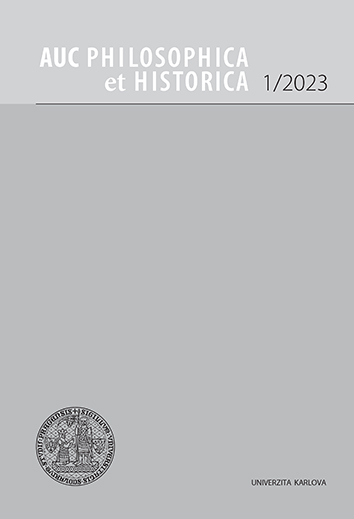AUC Philosophica et Historica je víceoborový akademický časopis zaměřený na humanitní a společenskovědné obory (filozofie, psychologie, pedagogika, sociologie, obecné, české a hospodářské dějiny, pomocné vědy historické a archivnictví, etnologie).
Časopis je indexován v databázích CEEOL, DOAJ a EBSCO.
AUC PHILOSOPHICA ET HISTORICA, Vol 1994 No 2 (1994), 9–25
Fenomén Jeffrey C. Alexander – od obhajoby T. Parsonse k neofunkcionalismu
[Fenomenon of Jeffrey Alexander – From the defence of Parsons to Neo-functionalism]
Eduard Urbánek
DOI: https://doi.org/10.14712/24647055.2018.71
zveřejněno: 15. 01. 2018
Abstract
The American sociologist J. Alexander represents a new generation of sociologists. His focus is on the questions of general sociology and sociological theory. At the late 1970s, he published the study on Formal and Substantial Voluntarism in the framework of Parson’s work. He aimed at the new evaluation of the Parson’s work in the opposition to his many critics in the USA, England and Germany. He finds the important influences of Kant’s philosophy and the issue of the human freedom in the first Parson’s work The Structure of Social Action. At the beginning of 1980’s he published the first volume of the Theoretical Logic in Sociology. The following 3 volumes contain the evaluation of Marx and Durkheim, M. Weber and T. Parsons. J. Alexander defends Parsons against his strict critics, and he himself expresses lots of critic remarks on some weaknesses Parsons influenced many sociologists in the USA by his work, he also got supporters in Germany (R. Muench partially also N. Luhmann). Alexander’s work contributed to the formation of neo-functionalism in the USA. Under the title Neo-functionalistic Sociology, the work was published in 1960, inspired also by the cooperation with P. Colomy. Neo-functionalism has been criticized by sociologists and philosophers grouped around Prof. H. Joas. Since WWII Alexander’s lectures on sociology and sociological theory express the development of his opinions. Alexander emphasizes the great importance of the classics for the development of the human sciences. He criticises scientism and positivism in a convincing way, but also criticises the one-sidedeness of subjectivistic attitudes in the social sciences. Alexander can be considered an important and attractive sociological personality. His work is both inspiring and controversial. His return to the classics is an example of his knowledge of these works as well as of their inaccuracy and simplification. He uses some terms in other senses than the critised classic – do, and he doesn’t always take into account their development. He attributes to Marx the opinions and explanations of his allies and critics. Parts of his works are hurriedly written. Surprisingly, Alexander devotes little attention to American pragmatic philosophy, and underestimates the contribution of G. H. Mead. However, he follows the development of J. Habermas’s works very systematically. He praises him because of his acceptance of some aspects of Parsons’s action theory, but he also points out a „cultural weaknesses“ in his work. He critices Habermas for not going far enough, so that strong residua of the Frankfurt School’s world view remain. In contrast to Alexander, H. Joas criticises Habermas for his compromises and claims that the acceptance of some basic elements of Parsons’s work is „an unhappy marriage of hermeneutics and functionalism“.
